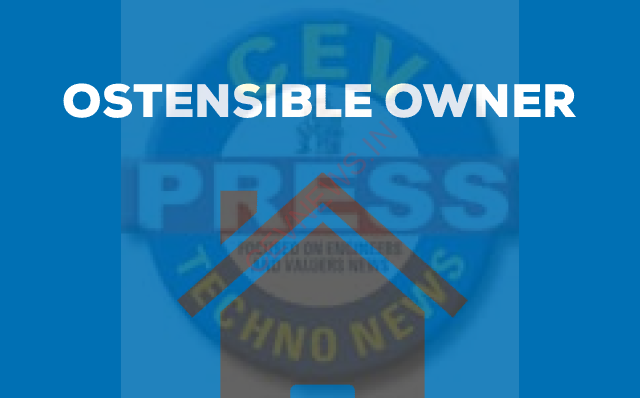MEANING OF “OSTENSIBLE OWNER” FOR A VALUER
Ostensible means something that is not real or true. Ostensible owner means a person who is not the real owner of the property he represents the real owner in transfers made to the third party
Ostensible owner as per act:
Section 41 of the act sets out that when a person acts on the express or implied consent of a person who is interested in an immovable property . The person who acts on such consent is the ostensible owner of the property. The provisions regarding transfer by ostensible owner are governed by section 41 of the transfer of property act, 1882
Ostensible Sale:
The seller agrees to sell his property on a certain sum of money but both the buyer and seller have the knowledge that the seller is apparently taking the Lian from the buyer
Criteria to be fulfilled for transfer of property by an ostensible owner:
1) The transfer executed by the transferor should be of immovable property and not a movable property
2) The real owner should give express or implied consent to a person to authorize him to act as an ostensible owner
3) The person who subsequently transfers the property should be the ostensible owner himself
4) the ostensible owner shall receive consideration for the transferred property from the purchaser
5) the purchaser must believe the ostensible owner to be the real owner and act in a good faith
6) he should have also exercised reasonable care while executing the transfer of the property by the transferor
Essentials of section 41:
1) consent
2) consideration
3) reasonable care and good faith
4) burden of proof – lies on Transferee
Example of Ostensible Owner:
A authorizes B his wife to perform all the rights of ownership in the property held by him while is he away. Hence when a transfer is executed by B, it can be said that B is the ostensible owner who has all the rights of the real owner in that property
Considerations in the property transfer by ostensible owner
1) Ostensible owner cannot give away the property as a gift
2) consideration is a necessary component of any contract
3) transfer of property by an ostensible owner is done by way of contract only
People who can’t be the ostensible owner
1) claimed specialists
2) trustee
3) servants
4) guardians
5) some other individuals acting under trustee character
The burden of proof on the transfer of property by ostensible owner
The responsibility of verification will lie on the Transferee. The Transferee needs to demonstrate that the transfer was executed in accordance with some basic honesty by him
Free consent as per section 13 of Indian contract act 1872:
Free consent refers to an agreement when both parties knowingly and willingly enter into a contract of their own will . This includes agreeing to all of its terms and conditions and a mutual level of understanding of the subject matter in the contract
Intelligent consent:
Intelligent consent is the consent that is not brought by a misapprehension of legal rights
Implied consent:
Implied Consent is consent that is not expressly granted by a person, but other implicitly granted by a person’s actions and the facts and circumstances
Express Consent:
Express consent is also sometimes known as informed consent
Facts and circumstances Criteria to determine ostensible owner:
1) the source of consideration during the purchase
2) nature of possession after the purchase, in terms of who had possession
3) motive behind such a transaction
4) relationship between the parties (real owner and ostensible owner)
5) conduct of the parties in dealing with the property (eg in terms of taking care of the property)
6) custody of the title deeds
Rights of ostensible owner:
1) ostensible owner possesses all the indicia of ownership like the right to title, possession, documents etc
2) he can transfer the property for consideration to the Transferee
Concept of transfer by ostensible:
1) Nemo dat quod non habet:
No one has the right or power to confer or present a higher right over the property than what he himself actually possess
2) Nemo plus juris and alium transferee protest quam ipsa habet
No person can transfer a title or right over the property greater than what he actually himself has
The related case for the ostensible owner
Jay Dayal Poddar Vs Biwi Hazara, 1974
Supreme Court held that the person is an ostensible owner or not is a subjective question to be decided based on facts and circumstances
The burden of proof that a transaction is Benami lies on the person who claims that he is the real owner
Indicia of ownership
1) possession is an indicia of ownership
2) exercise of acts of possession is an ostensible act of ownership, but not always
3) possession for 25 years
4) widow in possession
Compiled by:-
Er. Avinash Kulkarni
Chartered Engineer, Govt Regd Valuer, IBBI Regd Valuer

